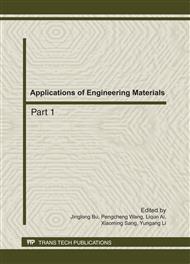p.120
p.124
p.128
p.132
p.136
p.140
p.145
p.150
p.154
Effect of Foaming Agent AC on the Properties of A12O3-SiC-C Trough Castables
Abstract:
The effects of foaming agent AC on anti-explosion performance and physical properties of castables for trough of blast furnace were investigated by using brown corundom, silicon carbide, Secar 71 cement and microsilica as the main starting materials. The results showed that the incorporation of foaming agent AC decreased the temperature and the maximum rate at which water escaped from the castables, and hence improved the anti-explosion properties of the castables. The reason was that foaming agent AC would decompose and release gases during heating and generate superfine open pores at lower temperature favoring the expulsion of water. With increasing the content of foaming agent AC, the apparent porosity increased while the bulk density and modulus of rupture as well as crushing strength decreased. The developed castables were successfully applied to factory experiment, indicating excellent anti-explosion performance.
Info:
Periodical:
Pages:
136-139
Citation:
Online since:
July 2011
Authors:
Keywords:
Price:
Сopyright:
© 2011 Trans Tech Publications Ltd. All Rights Reserved
Share:
Citation:


